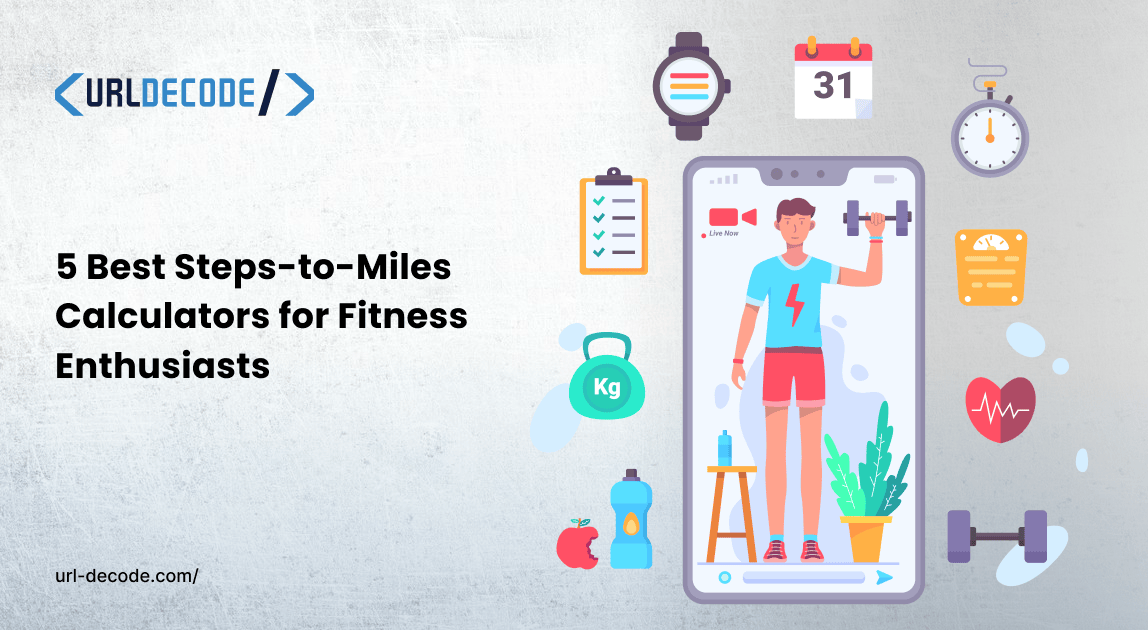5 Best Steps-to-Miles Calculators for Fitness Enthusiasts

Everyone wants to stay fit, but struggling to achieve the fitness goal is not so easy. By tracking your steps each day and converting them into miles, you can easily know how much distance you have actually covered. It helps you keep motivated and set realistic goals, so that you can reach them easily.
To help you in the fitness journey, an online steps to miles calculator plays an important role. It only requires the number of steps you have taken as input and shows you how much distance you have covered in miles. To make things easier for you, we’ve rounded up the top 5 steps-to-miles calculators you can use to stay on top of your fitness journey.
Why Convert Steps to Miles?
While counting steps is motivating, miles tell a more meaningful story. Seeing your effort translated into distance helps you plan routes, compare workouts, and set specific targets, like “I’ll walk 1.42 miles today” instead of “I’ll walk 3,000 steps.”
Converting steps to miles also gives you a better sense of how many calories you’re burning and how far you’ve come over time. It’s a small change that makes tracking your progress a lot clearer. It also allows you to compare your performance over time and stay consistent with your fitness routine.
How We Chose These Five Tools
We focused on tools that are practical, simple, and easy for anyone to use. Each of the calculators we’ve listed:
- Let you enter steps or stride length
- Offer a quick result
- Works smoothly on both desktop and mobile
- Keep the process simple and reliable
Whether you’re a casual walker or a runner, these conversion tools are designed to fit seamlessly into your daily routine. With that in mind, here are our top picks.
1. Calculatored.com - Clean and Direct
This online tool converts your steps to miles with a couple of inputs. You need to choose your gender and enter the number of steps you have taken into its designated field. The calculator then instantly shows you the distance in miles. If you want a simple and fast way to calculate your steps to miles, then try the steps to miles calculator by calculatored.com. It works well when you want a quick calculation from the step count.
Best for
People who want a fast and easy-to-use web tool.
2. Omnicalculator.com - Flexible and Detailed
Different browser calculators let you choose units and enter more details, such as step frequency or average pace. This tool lets you switch between metric and imperial units and shows short notes about how stride length affects accuracy.
Best for
Users who like a little extra control without installing an app.
3. Smartphone Health Apps - Automatic and Always with You
Apple Health and Google Fit save your step counts and estimate distances automatically. These apps use your phone’s sensors and your stored height to guess your stride length. You do not need to enter steps manually. The app updates your daily totals and shows weekly or monthly trends.
Best for
People who prefer hands-off tracking and trend views.
4. Fitness Tracker Apps - Device-Powered Accuracy
If you wear a smartwatch or fitness band, its app often converts steps to miles. The app easily pairs with the tracker or watch that counts steps with motion sensors. It also lets you calibrate stride length or profile height to improve accuracy.
Best for
This tool is best for those who prefer wearing tracking devices.
5. Custom Stride Calculators - Calibrate for Exact Results
In order to get the most accurate steps-to-miles conversion, you can measure your own stride length. It’s simple: First, choose a known distance, like 100 feet. Then, count how many steps it takes to walk that distance. Next, divide the distance (100 feet) by the number of steps you took to find your stride length. Once you know your stride length, you can use it in any steps-to-miles calculator to get more precise results.
Best for
Those who want more accurate and precise measurements can use these calculators.
Quick How-To: Measure Your Stride in 3 Simple Steps
- Pick a flat and measured distance such as 20 feet or 10 meters.
- Walk that distance at your normal pace and count every step.
- Divide the distance by the step count to get the stride length. Use that number in your calculator.
This small step improves accuracy more than any fancy feature.
Which one should you pick?
Each tool has its own strengths:
- For speed and simplicity: Go with Calculatored.com.
- For flexible unit options: Try Omnicalculator.com.
- For mobile convenience: Use Apple Health or Google Fit.
- For device integration: Stick with your fitness tracker’s app.
- For ultimate precision: Measure your stride and use a customizable calculator.
Tips to Improve Accuracy
- Measure stride while walking, not running. Stride changes with pace.
- Re-check stride length when you gain or lose height for any reason, or after major changes in fitness.
- Compare app estimates with a measured route to see how they differ.
Final Thoughts
Converting steps to miles helps you plan workouts and track real progress. Each calculator has trade-offs. Start with a quick tool like calculatored.com or your phone app. Then, if you want better precision, measure your stride and switch to a calculator that accepts that input. Simple steps make tracking clear and useful.




